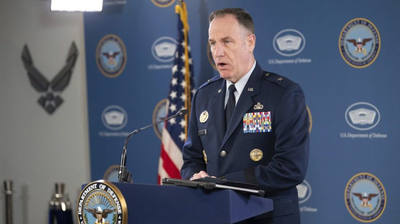
The U.S. for months has had more than 2,000 troops inside Syria, more than double the 900 troops the Defense Department previously said are on the ground there, the Pentagon’s top spokesperson revealed Thursday.
The increased force presence has “been going on for a while,” with press secretary Maj. Gen. Pat Ryder estimating that the troops have been there “at a minimum, months.” But he stressed the extra troops are supporting the counter-ISIS mission and were unrelated to the fall of Syrian dictator Bashar Assad’s regime two weeks ago.
The new figures are particularly notable as the Pentagon in recent days and weeks has been asked repeatedly about its troop presence in Syria, with the stark increase never disclosed.
A “core 900” U.S. service members are in the country as part of an official nine to 12 month deployment, with another 1,100 troops there on a temporary basis for 30 to 90 days “to address shifting mission requirements,” Ryder told reporters. He added that Army conventional and special operations troops make up most of the extra forces.
Pressed on why the Pentagon did not reveal the updated numbers until now, Ryder said he had only learned of the new figure earlier Thursday and cited “sensitivity from a diplomatic and operational security standpoint.”
He also noted that Defense Secretary Lloyd Austin was aware of the increased forces but has not spoken about it with Gen. Michael “Erik” Kurilla, who oversees U.S. Central Command.
Asked whether President Biden was aware of the extra forces, Ryder said he would not speak for the White House.
A request for comment to the White House wasn’t immediately returned.
Assad was overthrown Dec. 8 after rebels entered the capital of Damascus, ending the family’s 50-year rule in the war-torn country. Israel and Turkey have since launched separate military operations inside Syria, with Israel striking Assad’s former weapons facilities and Turkey attacking Kurdish forces — a partner of the U.S. in its fight against ISIS.
The U.S., meanwhile, has increased its airstrikes on ISIS targets in Syria to prevent a resurgence of the group amid concerns of a power vacuum.